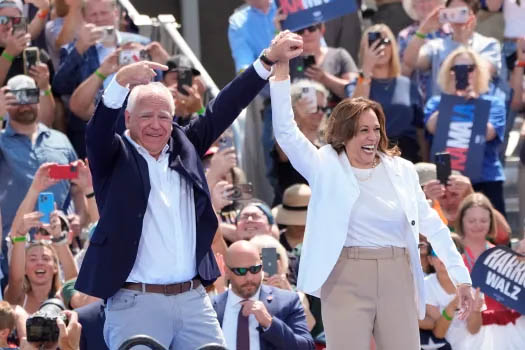America: With this simple critique—as well as an overall more streamlined message—Vice President Kamala Harris’s presidential campaign has shifted the conversation away from the weaknesses of her boss, President Joe Biden, and focused on his opponent, Donald Trump. The change of tone was on full display at rallies this week, where she appeared alongside her new vice-presidential candidate, Minnesota Governor Tim Walz. Using Beyoncé’s Freedom as their soundtrack, the pair made the case that they are out to defend American freedoms, while their “weird” Republican opponent, Trump, and his running mate J.D. Vance threaten to take them away. “We’re not going back,” Ms. Harris told a cheering crowd in Philadelphia, uttering what has become the campaign’s de facto slogan. It’s a stripped-down version of Mr. Biden’s 2020 message—that Trump is “a threat to democracy”—that removes the former president from American life. Even the vice president’s press releases, once sent out from a campaign serving Mr Biden, have changed the tone from serious to something more light-hearted.
Just five days after Mr Biden’s withdrawal,
Harris’ spokesman quipped that Trump’s speech made her “sound like someone you wouldn’t want to sit next to in a restaurant”. Campaign strategists say this new message is appealing to Democrat-leaning voters because it makes voting for Ms Harris seem more like a common-sense choice and less like a civic chore. But it is too early to tell whether this fresh goodwill for the vice president, who has recently struggled to capture the attention of US voters, will last until November’s election day. California Lieutenant Governor Eleni Kounalaki, a Democrat who considers the vice president a close friend, said the campaign’s refreshed rhetoric reflected Ms Harris’s “great sense of humour” and her ability to be “a good communicator at a very basic level”. “The truth is that these things are proving to be their strength and their joy is breaking through the dark, dangerous aspects of Donald Trump and his fellow candidates.” Meanwhile, Trump, known as an effective mudslinger and energetic campaigner since entering politics during the 2016 presidential campaign, has struggled to hit back — particularly against the “weird” framing. “They’re weird. Nobody’s ever called me weird. I’m a lot of things, but I’m not weird,” Trump said in an interview last week with conservative radio host Clay Travis.
